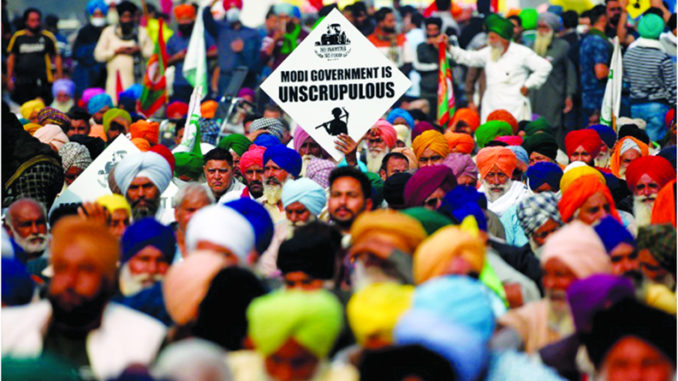
Farmer unions lost no time in rejecting the amendments proposed by the Union government to the current farm laws. BKU (Dakuanda) general secretary Jagmohan Singh Patiala explains point-by-point why farmers are objecting to Centre’s offer.
Centre’s proposal
State governments can impose fee/cess on the private mandis
Farmers’ objection
“Creation of private mandis along with the state-run Agriculture Produce Market Committees (APMC) will push all agriculture businesses towards private markets. The result will be the end of government markets and intermediary (commission agent) systems as well as APMC systems. After that only big traders and giant companies will operate in the markets and procure farm produce at incidental prices. The government has proposed that there will be uniform policy of taxes, fee, and cess both for government and private markets. But the governments would deliberately delay procurement as in case of paddy and turn the public markets inefficient and redundant.”
Centre’s proposal
Written assurance from government for the continuation of the existing MSP system
Farmers’ objection
“We are not only apprehensive but fully convinced that the new agricultural Acts are brought to dismantle APMCs. Therefore, we are demanding that the Union government should employ a comprehensive Act on MSP for the whole country and for all crops. But the government is dragging its feet to bring legislation on this issue and only talking for a written assurance, which is not a legal document and has no guarantee. That’s why farmers have rejected the government proposal of written assurance and insisted on repeal of these anti-farmers Acts.”
Centre’s proposa
State governments can register traders to regulate them
Farmers’ objection
“The present farm laws have no provision to regulate the traders. These Acts give permission to any PAN cardholder to procure grains from the markets at wishful prices and indulge in hoarding. Instead of making provisions of registration to regulate the traders, the Central is trying to pass the buck to state governments to regulate the traders. So, the Centre is not ready to take any responsibility on this issue. This is also being proposed under the pressures of farmer organisations.”
Centre’s proposal
Under the contract farming law, farmers will have the alternative to approach the court and their land will be safe as no loan will be given on farmers’ land and their buildings by mortgaging it.
Farmers’ objection
“Farm outfits are apprehensive about grabbing the farmers’ land by the large corporations under the contract farming. The Union government has put a proposal to allay the fears of farmers by saying that there will be no sale, lease, and transfer of land during the period of contract agreement. But the history of contract farming has many examples of non-payment by the companies making various excuses like substandard produce. It has happened in the case of sugarcane where payments were held for many years or cases of non-procurement making excuses of poor quality. It has pushed the farmers into a debt trap. In such cases farmers are unable to repay the loans and have no option other than to sell/lose their lands. The contract farming has resulted in displacing and destroying the farmers all over the world. Even in the USA, where huge subsidies are given for the agriculture sector the farmers are forced to commit suicides.”
Centre’s proposal
Power Bill 2020 is only a draft open for discussion
Farmers’ objection
“The Union government wants to control the power sector by taking it from the jurisdiction of states. It wants to discontinue the subsidies to farmers. The WTO has given repeated instructions to Indian government to discontinue the subsidies. Therefore the Modi government wants to bring the power sector under the central control. The farmers are opposing this move. The government is proposing to exclude subsidies from this Bill and saying that power subsidy will be transferred to farmers in cash, which is practically not possible when there are a majority of small and marginal farmers who cannot pay their power bills first and then to avail subsidy.”
Centre’s proposal
Willing to amend law on controlling NCR pollution
Farmers’ objection
“Union government thinks that stubble burning of paddy is responsible for pollution in Delhi and so they have enacted a legislation of stringent punishments and heavy fines up to Rs 1 crore for the alleged violators. Now under the pressure of farmer organisations the government is proposing for amendments. This law is just to harass the poor and small farmers.
The proposed amendments have nothing to offer and farmer organisations are determined to continue the united struggle till the repeal of these Acts.”
Source: Indian Express





Be the first to comment